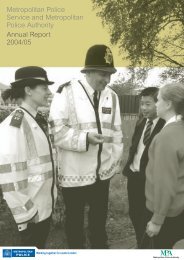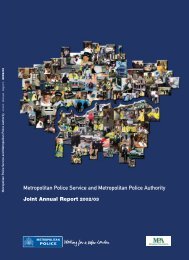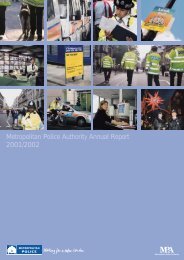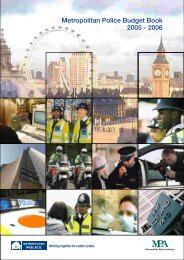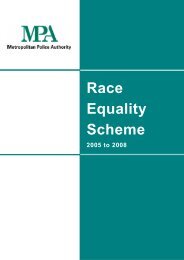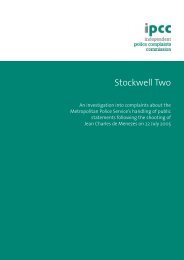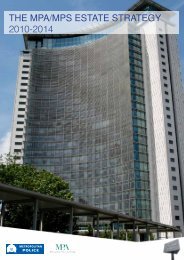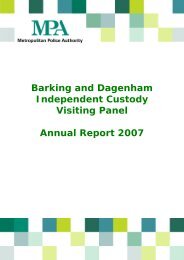Final Report of the Morris Inquiry: The Case for Change
Final Report of the Morris Inquiry: The Case for Change
Final Report of the Morris Inquiry: The Case for Change
You also want an ePaper? Increase the reach of your titles
YUMPU automatically turns print PDFs into web optimized ePapers that Google loves.
THE CASE FOR CHANGE<br />
2.67 As an example, we received evidence <strong>of</strong> one case where serious allegations <strong>of</strong><br />
corruption were made against two <strong>of</strong>ficers in 1994. <strong>The</strong> <strong>of</strong>ficers were suspended in<br />
1997. Fur<strong>the</strong>r allegations were made and in 1998 <strong>the</strong> <strong>of</strong>ficers were charged with<br />
criminal <strong>of</strong>fences in relation to <strong>the</strong>se later allegations. <strong>The</strong> case was dismissed at<br />
committal proceedings in 1999. A disciplinary investigation <strong>the</strong>n began with<br />
disciplinary papers being served in 2002. <strong>The</strong> case was heard in 2004 and both<br />
<strong>of</strong>ficers were required to resign. We make no comment on responsibility <strong>for</strong> <strong>the</strong><br />
delays in this case but simply use it as an example <strong>of</strong> <strong>the</strong> unsatisfactory operation<br />
<strong>of</strong> <strong>the</strong> current system.<br />
2.68 In addition <strong>the</strong> proceedings are characterised by <strong>the</strong> extensive involvement<br />
<strong>of</strong> lawyers:<br />
“If one considers that it is quite possible that <strong>the</strong> existing framework can create a situation<br />
whereby <strong>the</strong> Presenting Officer is represented by Q.C. (and junior) instructed by <strong>the</strong> Force<br />
Solicitor, with ano<strong>the</strong>r Q.C. likewise instructed to act as legal advisor to <strong>the</strong> Tribunal, and with<br />
yet ano<strong>the</strong>r Q.C. representing <strong>the</strong> accused <strong>of</strong>ficer in a hearing scheduled over a period <strong>of</strong><br />
many months (several weeks <strong>of</strong> which may be taken up with arguments on abuse <strong>of</strong> process<br />
and disclosure), <strong>the</strong>n one sees at times <strong>the</strong> true nature <strong>of</strong> a system that has as its ultimate<br />
sanction <strong>the</strong> power to dismiss an individual from his or her employment. Such a scenario is<br />
impossible to reconcile with any easily understandable concept <strong>of</strong> a ‘management process’ as<br />
referred to in <strong>the</strong> submission <strong>of</strong> Ken Jones, <strong>the</strong> Chief Constable <strong>of</strong> Sussex Constabulary.”<br />
(Submission from <strong>the</strong> Metropolitan Black Police Association (MBPA).)<br />
2.69 <strong>The</strong> <strong>Inquiry</strong> has heard that delays have many causes and can sometimes be<br />
attributed to <strong>the</strong> investigating <strong>of</strong>ficers or to so-called ‘tactics’ employed on behalf<br />
<strong>of</strong> <strong>the</strong> <strong>of</strong>ficer to prolong or defer an investigation. “<strong>The</strong>se range from abuse <strong>of</strong> ill health<br />
procedures to solicitors failing to consult <strong>the</strong>ir clients causing interviews to be delayed.”<br />
(Submission from Ken Jones, Chief Constable <strong>of</strong> Sussex.)<br />
2.70 Officers subject to disciplinary investigation can be left suspended <strong>for</strong> several<br />
years while <strong>the</strong> process rolls on, or alternatively grinds to a halt. No one benefits<br />
from this antiquated and anachronistic system o<strong>the</strong>r than <strong>the</strong> guilty <strong>of</strong>ficer. An<br />
‘innocent’ <strong>of</strong>ficer, most likely under great strain, is left to languish at home when he<br />
or she should be ‘on <strong>the</strong> streets’ protecting <strong>the</strong> public. <strong>The</strong> ‘guilty’ <strong>of</strong>ficer remains<br />
on <strong>the</strong> payroll at <strong>the</strong> taxpayers’ expense.<br />
“It is well known that police <strong>of</strong>ficers can wait <strong>for</strong> up to a year to go be<strong>for</strong>e a disciplinary<br />
tribunal. Such delays are seriously damaging to <strong>the</strong> credibility <strong>of</strong> <strong>the</strong> disciplinary system and <strong>the</strong><br />
complaints system. Delays <strong>of</strong> this magnitude mean difficulties in sustaining charges because<br />
witnesses’ memories have faded or <strong>the</strong>y are unwilling to give evidence.”<br />
(Submission from Sir Alistair Graham, <strong>for</strong>mer Chairman <strong>of</strong> <strong>the</strong> PCA.)<br />
2.71 <strong>The</strong>re is clearly a serious potential <strong>for</strong> such a long drawn out process to<br />
undermine public confidence in <strong>the</strong> police service. <strong>The</strong> APA drew our attention to<br />
<strong>the</strong> recent cases following from <strong>the</strong> BBC documentary, <strong>The</strong> Secret Policeman, as an<br />
42



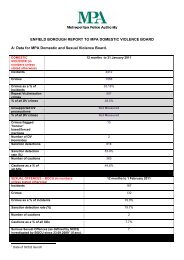
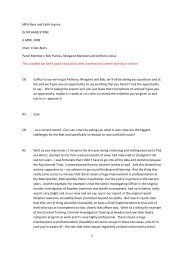
![Appendix 1 [PDF]](https://img.yumpu.com/51078997/1/184x260/appendix-1-pdf.jpg?quality=85)
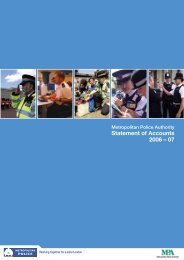
![Transcript of this meeting [PDF]](https://img.yumpu.com/50087310/1/184x260/transcript-of-this-meeting-pdf.jpg?quality=85)
![Street drinking in Hounslow [PDF]](https://img.yumpu.com/49411456/1/184x260/street-drinking-in-hounslow-pdf.jpg?quality=85)
